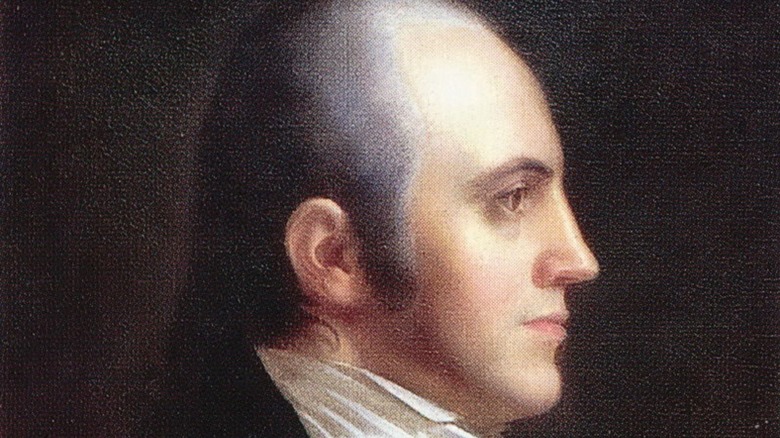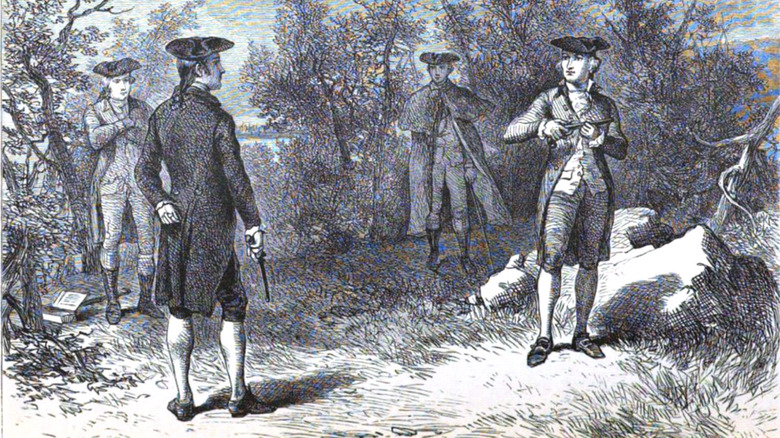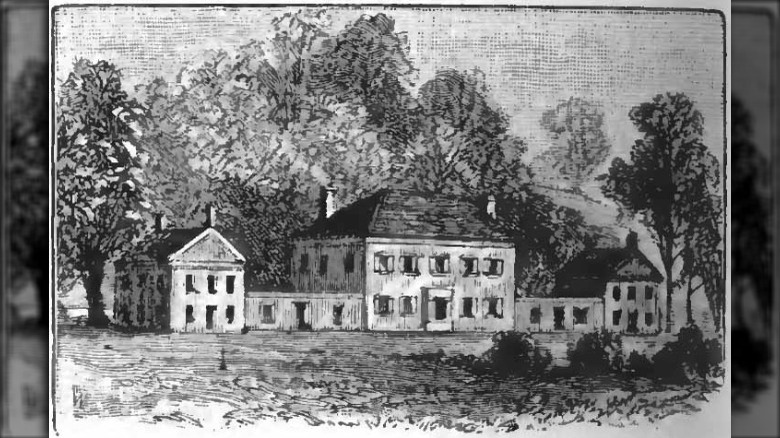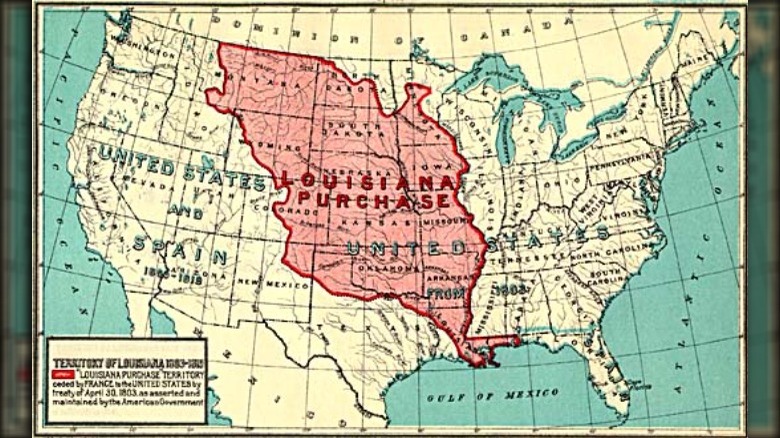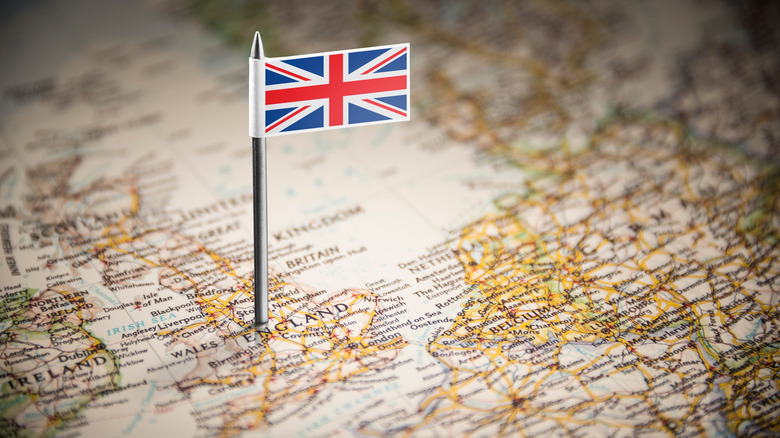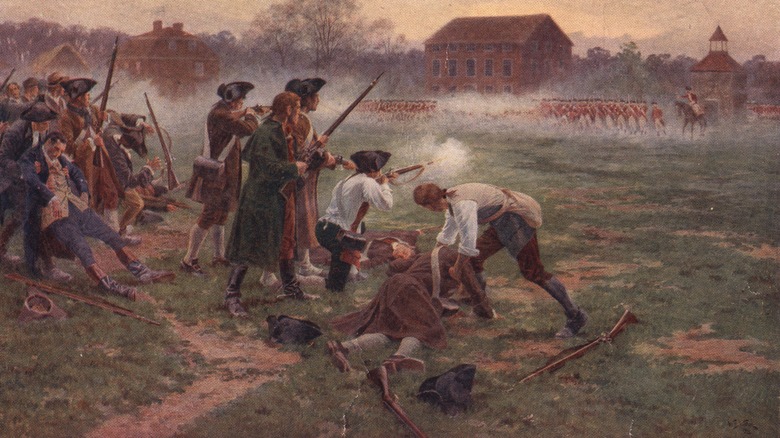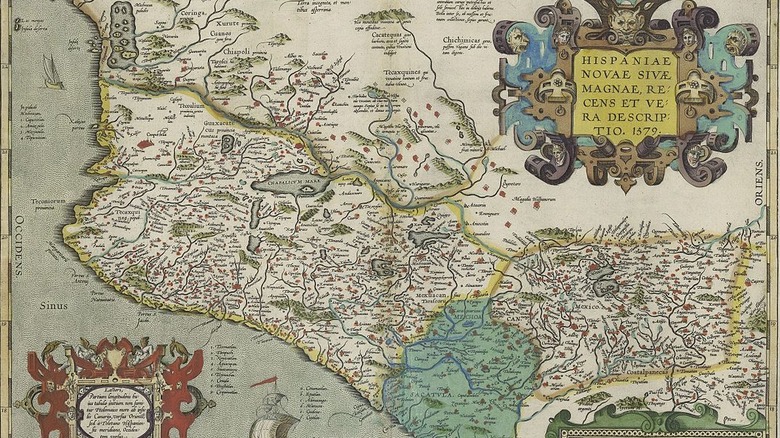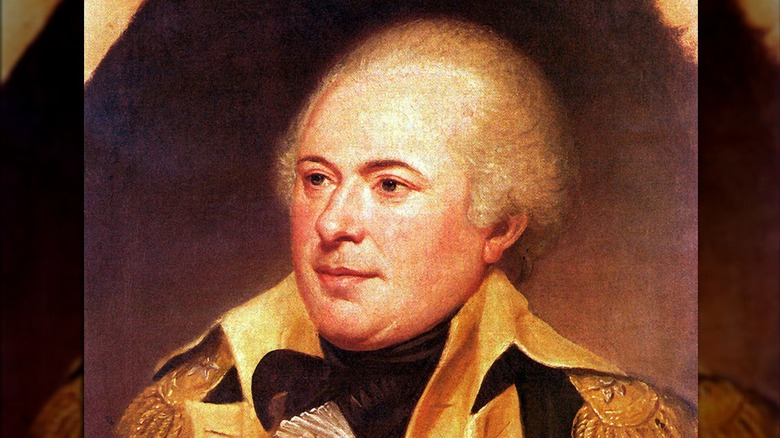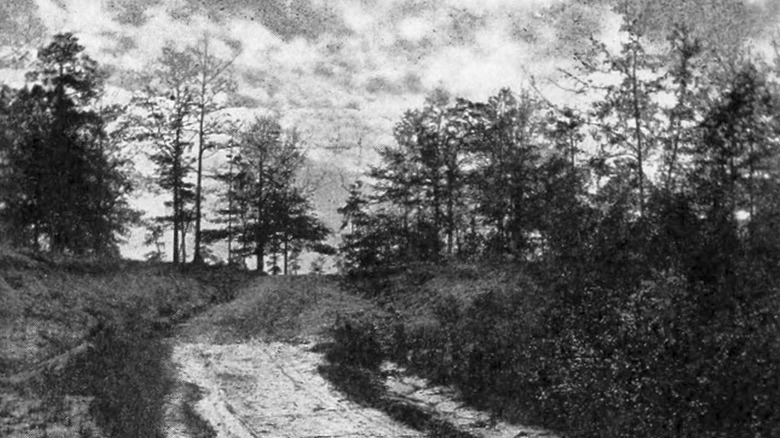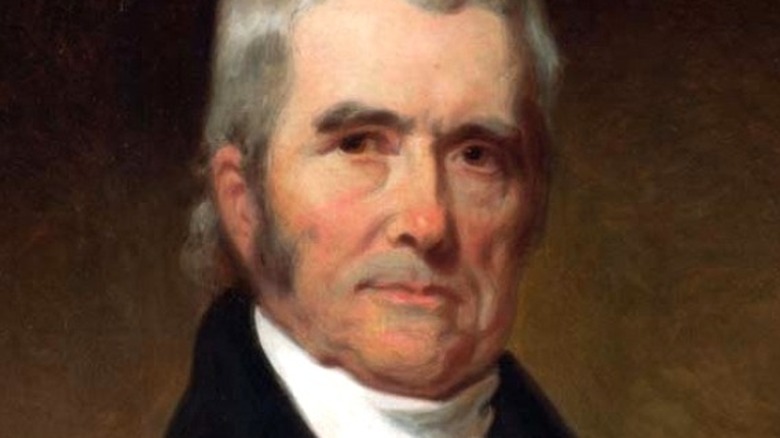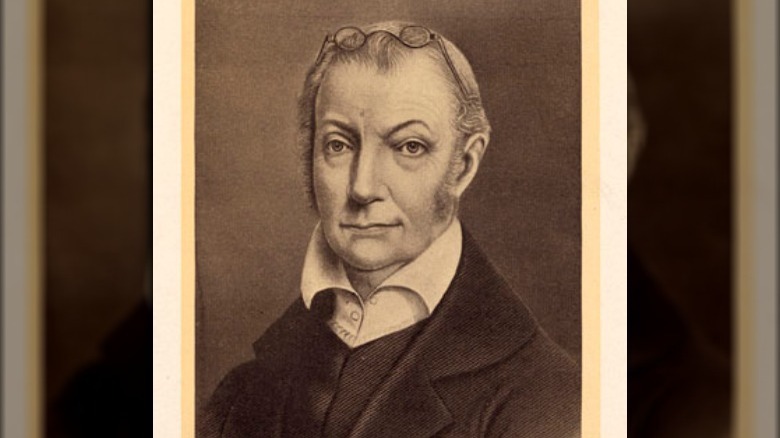Here's Why Aaron Burr Might Have Committed Treason
"Hamilton" has been out for a decent amount of time, not to mention the musical's more recent release on Disney+. It's been all over the internet, but in case you somehow haven't seen or heard of it, here's the primer. Basically, the musical follows the titular Alexander Hamilton before, during, and after the Revolutionary War, highlighting various different highs and lows in his life, including his long-time rivalry with Aaron Burr. It ends with the famous duel between the two which ended in Hamilton's death, and the entire sequence is played out beautifully.
In real history, though, Burr's story didn't end there. Sure, it's narratively satisfying for the purposes of the stage, but Burr still had quite a few more years ahead of him. And, in all honesty, those years post-duel, especially immediately post-duel, are absolutely wild. The man who was apparently willing to "wait for it" gave up on that policy entirely and went off to really make his mark in the most dramatic way possible. Even if those plans to do so involved potential secession, war, and treason, only to end in years of self-imposed exile.
Again, it's a whole, weird story, and one that sounds ridiculous when summarized, and maybe even more ridiculous when expanded upon.
Aaron Burr was desperate
From a young age, Aaron Burr seemed like the type who would rise to greatness in the young United States. As History explains, he came from a really well-off family with an impressive lineage of influential figures. Even John Adams recognized Burr as someone who was almost guaranteed a top spot in American society. Plus, he had more going for him than just his name. According to "Burr: An American Conspiracy," he had the intelligence and ambition to back up whatever he planned to accomplish, graduating college at just 16 (and being one of few people in America to graduate from college at all). After coming out of the Revolutionary War as a hero, his future should've been bright.
But after his famous duel with Alexander Hamilton, well, things just fell apart. His reputation was in shambles. Sure, he was vice president to Thomas Jefferson at the time, but that meant very little. Jefferson trusted him with approximately nothing of value, and he was left out of major decisions, even including the purchase of the Louisiana Territory. The rest of the cabinet didn't seem to trust him much either, recalling that he was usually absent from meetings and events. They just never really saw him.
So when Burr was released from his tenure as vice president in 1805, he was kind of at the end of his rope, desperate to find any possible way to salvage his reputation.
Aaron Burr's actions started raising suspicion
Shortly after his term as vice president ended in 1805, Aaron Burr decided that his best choice was to start heading out west. Per History, in that same year, he began scouting out areas in the recently-purchased Louisiana Territory, seeing it as the perfect setting for him to start up some sort of grand enterprise. He headed out near the Ohio and Mississippi Rivers, trying to rally supporters for some vague and nebulous plan that he had apparently concocted.
He needed the financial support (and just support in general), and he did manage to find some. While in Virginia, Burr met Harman Blennerhassett, a wealthy and eccentric Irish immigrant who owned an island in the middle of the Ohio River, which could prove to be the perfect base of operations for his schemes (via "Burr: An American Conspiracy"). Burr's support would also grow to include various other businessmen in the area, on top of U.S. military officials and a couple of foreign diplomats.
All that said, none of his movements went unnoticed. Though no one knew exactly what he was planning, by the time he had returned to the East Coast, rumors were already flying about why he had gone on this months-long survey of the western territories. Even Jefferson eventually noticed that Burr had just disappeared off into the west with no one able to vouch for what exactly he was planning. (Not that he did much about the situation. Initially, at least).
The new territories wanted independence, according to Aaron Burr
The purchase of the Louisiana Territory wasn't completely smooth. Sure, when it comes to the higher-ups, it looked good and is one of those big accomplishments attributed to Thomas Jefferson. But out in the Louisiana Territory itself, it was something of a different story. According to American Experience, the actual borders of the territory were still in dispute with Spain (which, at the time, still held the land that's now the western United States), and New Orleans was in a prime location for an attack by the Spanish (via "Burr: An American Conspiracy"). There was a lot of tension in the area over that dispute, and locals were talking about the idea of secession.
Aaron Burr saw that tension as an opportunity, though, and began stirring the pot further. He started crowing to the public at large that the residents of the Louisiana Territory were just about ready to fight for their independence. Blennerhassett proved to be really useful in this part of the plan, too, with Burr convincing him to write anonymously to newspapers, further spreading stories of unrest in the territories.
The people wanted their independence, after all! And how could anyone in the newly-freed United States disagree with that? It's an image that Burr really wanted to spread to the world.
Aaron Burr looked to outside powers for help
Even though Aaron Burr did manage to pull together his own little band of supporters in the Louisiana Territory, he also started reaching out to certain foreign dignitaries, and, at first, things looked promising. Burr began by reaching out to the British, contacting foreign minister Anthony Merry, who sent a message to the British government saying that Burr was willing to help them in whatever capacity they desired (via History). Yes. He'd help them. Even though he had just fought against the British some three decades earlier. He intended to gain their support via the alluring prospect of the secession of the western territories.
Burr extended the same sort of offer to the Spanish government, too (even though disputes with the Spanish were the source of tensions in the west). Through Minister Carlos Martinez de Yrujo, he sent a message to Spain, asking for funding, and it was a request that de Yrujo actually agreed to himself, according to "Burr: An American Conspiracy."
Ultimately, his plans to seduce other nations with the possibility that the new U.S. might fall apart never panned out. Per the National Counterintelligence Center, the British might've been interested, but Prime Minister William Pitt had just recently died, and his successor Charles Fox was a friend to the U.S. He was disgusted by the thought and would have no part in it. And as for Spain? The whole plan just sounded too ridiculous to be true, and officials in Madrid quickly rejected it.
Aaron Burr planned for war
Really, when it comes to the question of where in the world Aaron Burr's allegiances actually lay, the answer is insanely hard to find. At the end of the day, History describes him best as an opportunist, ready to jump on anything that might help him out personally, even if that helpful thing might be war.
Basically, there were pre-existing tensions in the western territories against Spain. According to "Burr: An American Conspiracy," invasion by the Spanish was seen as a very real threat — one that Burr thought he could count on. He started putting together his own volunteer army (via American Heritage) and purportedly claimed that the success of his plans depended on the start of war between the U.S. and Spain (via NPR). But why did this hypothetical war matter so much to him? Well, military conflict would essentially give Burr a chance to rise through the ranks once again. It was just the engine for him to be able to grab for military power, which would also give him the opportunity to carve out his own little niche of influence and land.
This war never happened, though. Realistically, Spain wasn't quite powerful enough for a full-on war to be all that feasible, and Burr's plans backfired. Eventually, he would be blamed for conspiring against both the U.S. and Spain to incite military conflict.
Annexing New Spain
Eventually, Aaron Burr ended up running into General (later President) Andrew Jackson, and, on the hunt for more influential supporters, attempted to convince him to join his cause.
As for how he managed that? Well, as "Burr: An American Conspiracy," explains, Jackson wasn't a big fan of Spain, or their ownership of New Spain, right along the western border of the Louisiana Territory. In terms of what Burr seems to have told Jackson, his plan involved attacking New Spain in the name of the United States, then allowing the U.S. government to annex the land. It's the reason that Burr himself claimed to be true when put on trial, and it also seems to line up with other rumors that had been floating around at the time. As far as people could tell, he wanted to do something about the Spanish holdings in Texas and northern Mexico, and had been working with a group of businessmen who actively wanted to annex Mexico in general (via History).
And Jackson agreed to this plan. Initially, at least. Over time, he also started to grow more suspicious and eventually wrote to Jefferson about his concerns surrounding Burr and whatever exactly he really had planned.
Some questionable figures allied with Aaron Burr
When it comes to the whole Burr Conspiracy, there are a couple names that tend to show up a lot. Blennerhassett — the guy who owned the island in the Ohio River — is one, but the other seemingly central figure is one General James Wilkinson (pictured above). Wilkinson got his start as a captain in the Continental Army, and from there, rose through the ranks (via National Counterintelligence Center) — a useful ally to have, and one who could explain away any military exploits Burr had in mind (via History). But Wilkinson had a much darker history, involved in conspiracy after conspiracy. At various points, he tried to depose George Washington as leader, lead the secession of Kentucky from the Union, and generally grab for greater military power. And as if that weren't enough, he actually betrayed that first conspiracy with the thought that it might somehow further his own goals (it didn't).
Oh, and if that wasn't enough, according to NPR, Wilkinson was simultaneously acting as a spy for the Spanish. Given the codename "agent 13," he exchanged American secrets for lots and lots of coin, almost allowing the Spanish to put a stop to the Lewis and Clark Expedition, among other things.
Understandably, no one really trusted the man. With all that in mind, would it come as any surprise that Wilkinson would eventually turn his back on Burr, too, handing over some pretty incriminating evidence to the U.S. government?
In general, Aaron Burr wanted to create an empire
Whatever it was that Aaron Burr truly intended to happen, there's a particular theme that seems to come up over and over: he wanted to end up as the leader of his own empire (via History). Or nation, but you get the point. As told by "Burr: An American Conspiracy," that seemed to be his intended outcome, regardless of how he got there. If a war between Spain and the U.S. had actually come to fruition, then he could've potentially managed to carve out his own piece of the land by somehow taking advantage of the chaos, essentially claiming the southwest U.S. and northern Mexico for himself.
More importantly, though, James Wilkinson eventually came forward with a seemingly undeniable piece of evidence against Burr: a cipher letter from the man himself. That letter not only seemed to imply that Burr wanted to actively levy war as a way to split the United States, conspiring against both the U.S. and Spain, but, in the aftermath of all that, he would be the one at the head of that new nation. Wilkinson would get to be his number two, should everything go to plan.
It sounded like really solid evidence of what Burr planned. A man who had lost all semblance of political power could make a nation where he now had all of the political power. It does make a lot of sense.
The Burr Conspiracy fell apart
Once more people were coming forward with their suspicions concerning Aaron Burr, things really fell apart. Despite initially dismissing the rumors, Thomas Jefferson decided to take action, calling for Burr's supporters and conspirators to be hunted down (via "Burr: An American Conspiracy"). Warrants for Burr's arrest (via History) and bounties on his head started spreading, so it was only a matter of time.
Raids were conducted on Blennerhassett's island, and Burr's support shrunk down to an absolutely pitiful force. Less than a hundred men were still loyal to him by December 10, 1806, which was when things really ended. Burr's supporters were gathered at the island, planning to make their move under the cover of night. Their route was headed out west via the Ohio River, but they never even got started, with the Ohio militia finding them and shutting down the entire operation. The militia took over the island and arrested everyone there.
Here's the thing though: Aaron Burr wasn't actually there. He was still in Nashville at the time and stayed on the river to avoid arrest, continuing to head south toward New Orleans. He didn't find out about the warrants and bounties until 1807 actually rolled around, and then did what he could to flee, trying to head toward Florida, before getting caught in Alabama in February of the same year (the actual location is shown above). Just a month later, he was brought back to Virginia, about to stand trial for high treason.
Failed accusations of high treason
By the time Aaron Burr arrived back in Virginia to stand trial, no one still really knew what exactly had happened with him out west, per History. But all the same, his trial turned out to be the biggest thing of 1807, according to "Burr: An American Conspiracy."
Ideally, the prosecution wanted to prove that Burr intended to split the country, and given the cipher letter detailing Burr's plans, it would've seemed like an easy conviction. But there were problems. Stories from witnesses — which were few, with Burr's supporters refusing to testify — were vague at best and contradictory at worst. The defense argued that the cipher letter was completely fake, something that James Wilkinson doctored to try and implicate Burr. (Even if the cipher letter was real, Wilkinson never actually explicitly referenced Burr. That was only implied, but, technically, could've been a reference to someone else entirely).
What sealed it for the defense, though, was the fact that Burr wasn't on the island when the arrests happened. Treason was defined such that it required an "overt act" to actually count as treason. Burr was never seen taking up arms in any way; there was no "overt act" on his part, and all he'd done was conspire. Chief Justice John Marshall (pictured) agreed with that logic, and Burr was acquitted in October 1807. That said, he was convicted for violating the Neutrality Act, but no one really cared about that point, compared to the high treason stuff.
No one really knows the truth
The Burr Conspiracy is fascinating. So many of the things that Burr told people seem to contradict each other — was he planning to help the Spanish? The British? The U.S.? None of the above? It creates this centuries-old puzzle that doesn't seem to have much of a solution.
Burr himself was known for secrecy. His colleagues saw him as especially guarded and covert, saying that he could "talk by the hour without ever letting out his opinion" (via American Heritage). "Hamilton" really does get it right — "Talk less. Smile more. Don't let them know what you're against or what you're for." It's insanely on-point; Burr managed to convince so many different people to support his plans that none of them actually understood.
The historical record turns out to be of little help. Burr's own papers are not really available to scholars, some of them lost in a shipwreck, some of them stolen, and some of them intentionally burned by his followers while they were being arrested at Blennerhassett's island. James Wilkinson's life as a double agent taught him to be crafty, and his paper trail, especially when it comes to Burr, is hard to track. Even Thomas Jefferson — who was known for keeping extensive written records — apparently wrote down few of his true thoughts about the conspiracy.
In the end, there are a bunch of holes in this story, and we can only wonder about what truly happened.
